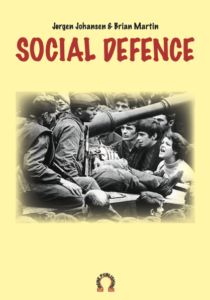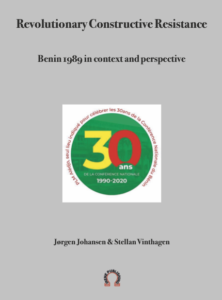Two New Books: Social Defence and Constructive Resistance
TRANSCEND MEMBERS, REVIEWS, LITERATURE, ANNOUNCEMENTS, 19 Aug 2019
Jørgen Johansen – TRANSCEND Media Service
 Social defence is nonviolent community resistance to aggression and repression, as an alternative to military forces. Given the enormous damage caused by military systems, social defence is an alternative worth investigating and pursuing.
Social defence is nonviolent community resistance to aggression and repression, as an alternative to military forces. Given the enormous damage caused by military systems, social defence is an alternative worth investigating and pursuing.
Since the 1980s, Jørgen Johansen and Brian Martin have been involved in promoting social defence. In this book, they provide an up-to-date treatment of the issues. They address the downsides of military systems, historical examples of nonviolent resistance to invasions and coups, key ideas about social defence, important developments since the end of the Cold War, and the role of social movements.
Social defence challenges deeply embedded assumptions about violence and defence. It is also a challenge to powerful groups with vested interests in systems of organised violence, especially militaries and governments. Popular action against aggression and repression is a radical alternative – and a logical one.
There is no quick solution for the problems caused by military systems. Treating social defence as a goal provides guidance for strengthening social movements and their campaigns. Social defence is part of the path towards a nonviolent future.
Order Social Defence from HERE
********************************
 From Poland 1980-89 to Algeria 2019 we can identify seven “waves” where massive civil society mobilization has successfully challenged the ruling regimes. These waves are not clearly delineated and do not follow a strict chronological order, but can still be grouped according to their similarities.
From Poland 1980-89 to Algeria 2019 we can identify seven “waves” where massive civil society mobilization has successfully challenged the ruling regimes. These waves are not clearly delineated and do not follow a strict chronological order, but can still be grouped according to their similarities.
These changes have mainly been done outside the accepted constitutional processes and civil society actors have been central driving forces. These peaceful strategies have not necessarily had a pacifistic value system as their basis, but neither have they included the use of organized armed violence. They instead involved pragmatic evaluations of what possibilities one had for winning the struggle.
It is necessarily so that many contextual factors impact the causes, realization, and outcome of revolutionary processes such as these. The contexts have varied greatly and there is difficulty in seeing any common factors for all cases.
In this booklet we have taken a closer look at Benin and the changes in 1989-90. Our hope is to inspire students and colleagues to do more research on less studied unarmed regime changes.
Only by studying and evaluating the experiences of the past can we better understand and help future generations in similar situations.
Order Revolutionary Constructive Resistance from HERE
________________________________________________
Jørgen Johansen is a nonviolence author/activist, editor of Irene Publishing, and a member of the TRANSCEND Network from Norway.
Tags: Activism, Conflict, Conflict Transformation, Economics, Environment, History, Human Rights, Nonviolence, Politics, Power, Solutions, World
This article originally appeared on Transcend Media Service (TMS) on 19 Aug 2019.
Anticopyright: Editorials and articles originated on TMS may be freely reprinted, disseminated, translated and used as background material, provided an acknowledgement and link to the source, TMS: Two New Books: Social Defence and Constructive Resistance, is included. Thank you.
If you enjoyed this article, please donate to TMS to join the growing list of TMS Supporters.

This work is licensed under a CC BY-NC 4.0 License.
Read more
Click here to go to the current weekly digest or pick another article:
TRANSCEND MEMBERS:
- Albert Einstein Foresaw the “Catastrophe" That Is Israel and Declined to Be President of Zionist Losers
- A Mnemonic Framework for Understanding Communication Challenges
- The Weaponizers of Antisemitism Have Come for the American Psychological Association
REVIEWS:
- The Spheral AI (SAI) Superiority from the Spheral Thinking Perpetual Peace Science. Primer. Peace Science and SAI
- Martyrs to the Unspeakable: A Luminous Tapestry of Truth
- Martyrs to the Unspeakable: The Assassinations of JFK, Malcolm, MLK, and RFK
LITERATURE:
- The Seventy-Six-Year Curse: All Has Been Washed White
- In the Penal Colony
- Naomi Klein and VV Ganeshananthan Win Women’s Prize Literary Awards
ANNOUNCEMENTS:
